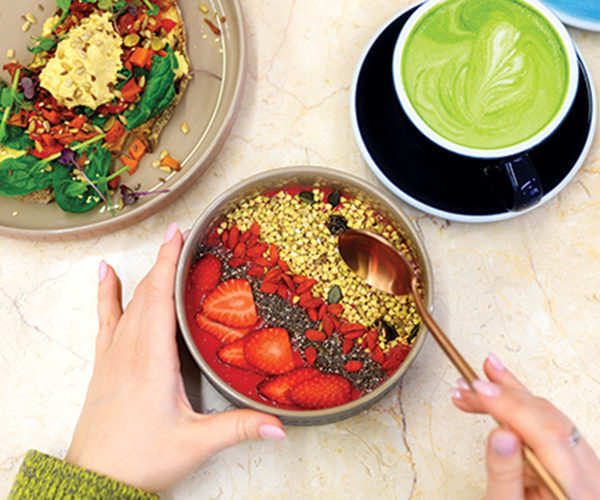Smart Eats
One of the best ways to keep your heart healthy is a balanced diet full of omega-3 fatty acids, antioxidants, fiber and unsaturated fats, which can reduce blood pressure, risk of blood clots and low-density lipoprotien cholesterol (bad cholesterol levels). Here are four Cleveland Clinic recommended foods to work into your diet. // Jason Brill
oatmeal » Benefit: Whether you call it hot cereal, porridge or oatmeal, this breakfast staple contains soluble fiber, which lowers bad cholesterol. How we like it: We start our day with a bowl of cooked steel-cut oats and mix in bananas for an extra dose of fiber.
salmon » Benefit: The American Heart Association recommends eating at least two servings of fish such as salmon, halibut or albacore tuna for the omega-3 fatty acids found within. How we like it: We shred a 3-ounce salmon filet over a bed of nutrient-packed romaine lettuce, throw in some chopped tomatoes and a drizzle of balsamic vinegar and olive oil over it.
Nuts » Benefit: When looking for a good and healthy snack, a daily handful of walnuts, almonds or pistachios loaded with polyunsaturated fats will keep blood vessels healthy and reduce your risk for heart disease. How we like it: Walnuts make a great addition to a bowl of oatmeal or a salad — just make sure they aren't salted or sugared.
extra-virgin olive oil » Benefit: This oil's mix of antioxidants gives it the ability to discern between good and bad cholesterol, lowering the latter while leaving the former alone. How we like it: In moderation, olive oil is great for sauteing vegetables or for dipping bread as an alternative for butter.
Sweet Surprise
Every year around Valentine's Day MetroHealth Medical Center cardiologist Dr. Catherine Fallick becomes very popular at dinner parties. "Is it really true that wine and chocolate can help your heart?" friends and dinner guests ask. The short answer, Fallick says, is yes: Wine and dark chocolate both have anti-inflammatory properties that strengthen and protect the heart. The natural follow-up question: "Which is better for you?" is a bit trickier. So we asked her to compare the two and pick a winner. // Rebecca Meiser
| DARK CHOCOLATE | RED WINE | |
| ANTIOXIDANTS | Flavanol | Polyphenol |
| "No one's ever looked at polyphenol and flavanol head-to-head, so there's no way of knowing whether one is better," says Fallick. But both antioxidants have been shown to decrease inflammation and platelet clumping. | ||
| INCREASES HIGH-DENSITY LIPOPROTIEN | No | Yes |
| "We don't know why wine increases HDL, [good cholesterol], it just does," says Fallick. | ||
| CALORIES | 25-50 (per one square) | 100 (per one small glass) |
| "If you need to be careful about not gaining weight, then chocolate would be the preferred choice here," she says. | ||
| DECREASES BLOOD CLOTS | Yes | Yes |
| "Clotting is one of the major causes of heart attacks," says Fallick. | ||
| DECREASES C-REACTIVE PROTEIN | Yes | Yes |
| "C-reactive proteins are all the rage now," says Fallick. "They've become an important biomarker of inflammation. People with inflammation in their arteries are more likely to have heart attacks." | ||
| THE WINNER » "It's a toss up," Fallick says. "But if it is unlikely that you will be able to eat only one square of chocolate, then the wine is better. Too much chocolate nullifies or decreases the benefit." | ||



